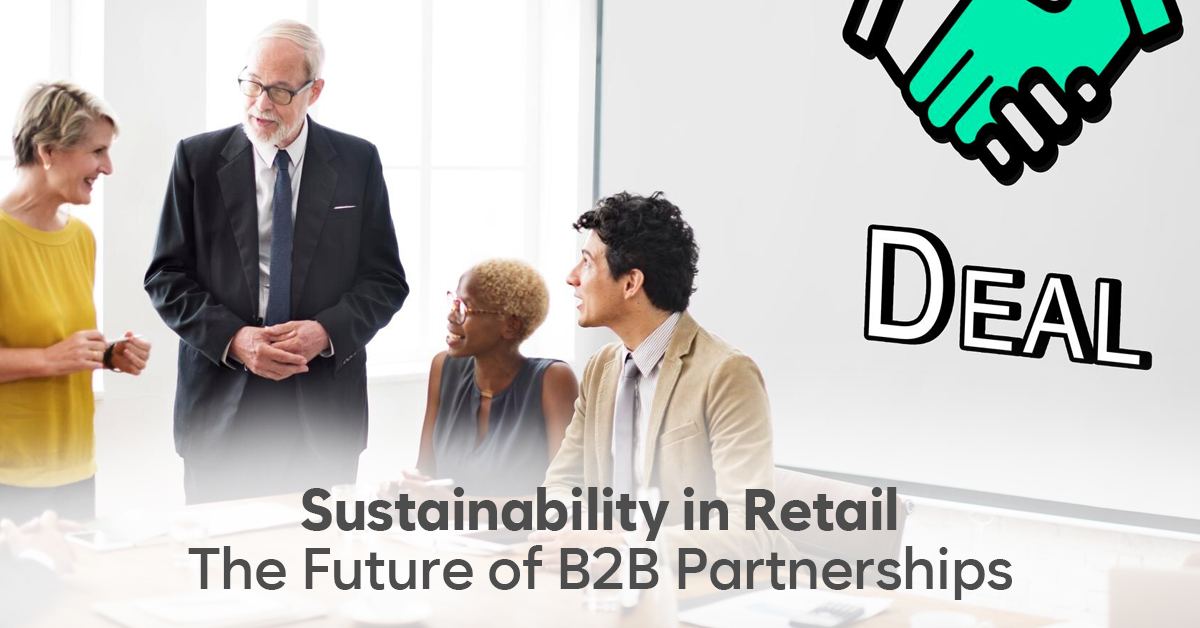In an era where climate change and environmental concerns have taken center stage, sustainability has become a key focus across various industries. The retail sector is witnessing a paradigm shift as businesses recognize the importance of adopting eco-friendly practices. This shift is not only driven by consumer demand for sustainable products but also by a growing realization that the future of B2B partnerships hinges on a commitment to environmental responsibility.
The Changing Landscape of Retail Sustainability
Sustainability in retail goes beyond using recyclable materials or reducing energy consumption; it encompasses the entire supply chain. From sourcing raw materials to manufacturing processes and transportation, retailers are re-evaluating their operations to minimize their ecological footprint. In this context, B2B partnerships play a crucial role in driving sustainable practices throughout the retail ecosystem.
One of the key aspects of sustainable B2B partnerships is the emphasis on transparency. Retailers are increasingly seeking suppliers and partners who are open about their environmental practices. This transparency allows retailers to make informed decisions about their supply chain. Thus, ensuring that every step aligns with their sustainability goals. It also fosters trust between partners and promotes accountability in the pursuit of shared environmental objectives.
The Rise of Circular Economy Initiatives
The traditional linear economy, which follows the “take, make, dispose” model, is no longer sustainable in the long run. Retailers are turning to the circular economy. This is where there is efficient use of resources, longevity is the force driving product design, and waste goes through recycling and repurposing. B2B partnerships are at the forefront of this transition, as suppliers and manufacturers collaborate to create products that can be easily disassembled and recycled.
For instance, clothing retailers are working with textile manufacturers to develop fabrics made from recycled materials. These partnerships not only reduce the demand for virgin resources but also contribute to the reduction of textile waste in landfills. By embracing circular economy principles, B2B collaborations are becoming catalysts for a more sustainable and resilient retail industry.
Collaborative Innovation for Sustainable Solutions
The future of B2B partnerships in retail lies in collaborative innovation that fosters sustainable solutions. Rather than viewing sustainability as a burden, retailers and their B2B partners are recognizing it as an opportunity for growth and differentiation. Collaborative innovation involves sharing knowledge, expertise, and resources to develop new products and processes that align with environmental goals.
For example, major retailers are collaborating with packaging manufacturers to create eco-friendly packaging solutions. From reducing single-use plastics to incorporating biodegradable materials, these partnerships are not only improving the environmental impact of packaging but also enhancing the overall brand image. Consumers are increasingly making purchasing decisions based on a brand’s commitment to sustainability, making these collaborative efforts a strategic imperative.
The Role of Technology in Sustainable B2B Partnerships
Technology is a powerful enabler of sustainability in retail B2B partnerships. Advanced analytics, blockchain, and artificial intelligence (AI) can trace and monitor the environmental impact of products throughout the supply chain. This level of transparency allows retailers to make data-driven decisions, ensuring that every partner in the supply chain adheres to sustainability standards.
Blockchain is revolutionizing transparency by providing an immutable and decentralized ledger of transactions. This technology enables retailers to trace the origin of raw materials, track the carbon footprint of products, and ensure ethical labor practices. By incorporating technology into B2B partnerships, retailers are not only meeting consumer expectations for transparency but also creating a more resilient and sustainable supply chain.
Challenges and Opportunities Ahead
While the shift towards sustainable B2B partnerships in retail is promising, it is not without its challenges. Many businesses face the dilemma of balancing sustainability goals with the need for cost-effectiveness. However, it is crucial to recognize that sustainable practices can lead to long-term cost savings, improved brand reputation, and increased customer loyalty.
Additionally, global supply chain complexities pose a challenge to the seamless integration of sustainability practices. B2B partnerships often span across borders, making it essential for retailers to work with partners who share a commitment to environmental responsibility. Overcoming these challenges requires a collective effort and a willingness to invest in the transformation of traditional business models.
Conclusion
Sustainability in retail is no longer a choice but a necessity for the future of the industry. B2B partnerships are at the forefront of this transformative journey, driving innovation, transparency, and accountability. The future of retail lies in collaborative efforts that prioritize environmental responsibility, from the sourcing of raw materials to the end-of-life of products.
As retailers and their B2B partners continue to embrace sustainability, they not only contribute to a healthier planet but also position themselves as leaders in a market where conscious consumer choices shape the future of commerce. The time for sustainable B2B partnerships in retail is now, and the path to a greener future is paved with collaboration, innovation, and a shared commitment to lasting change.






